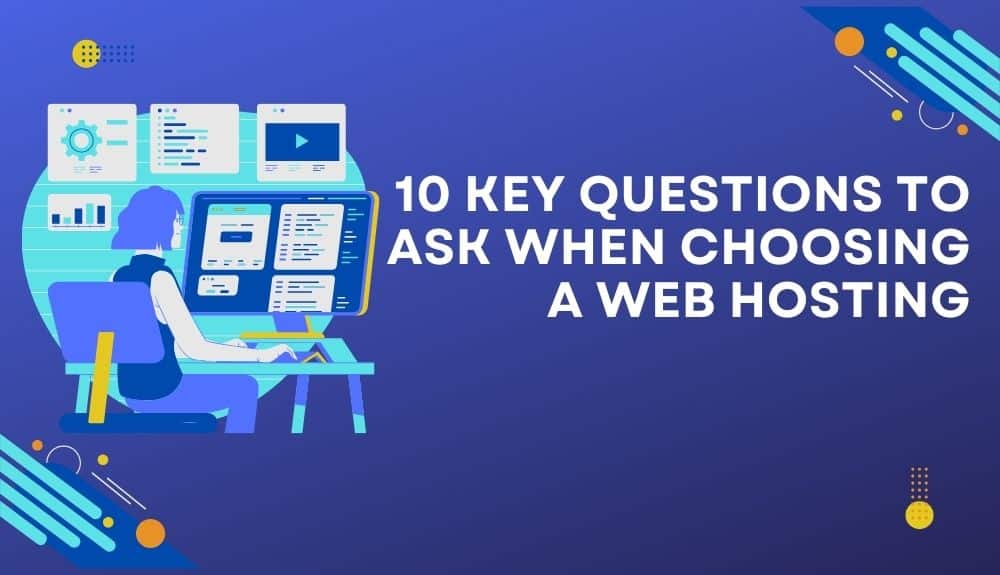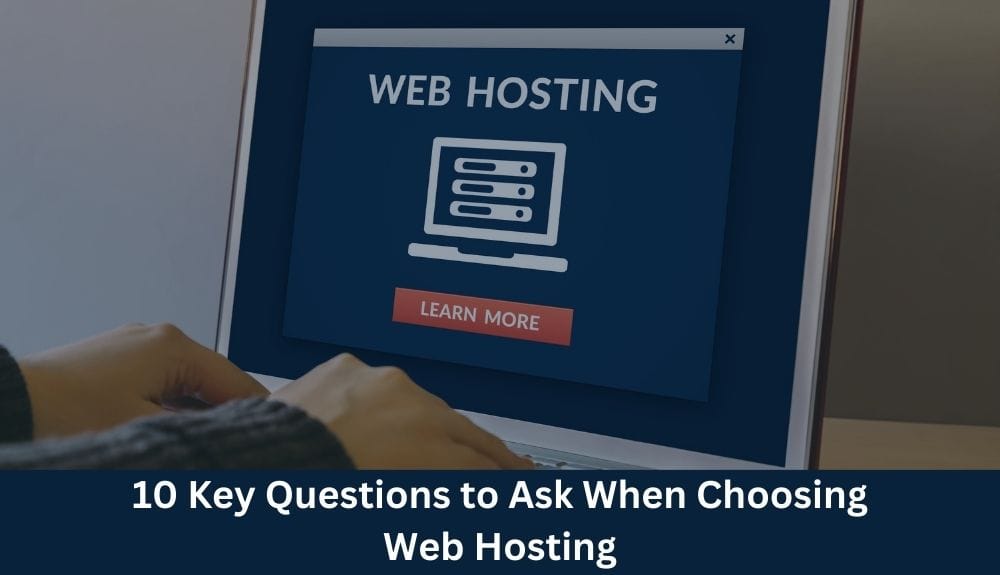- 02nd Dec, 2023
- No Comments
10 Key Questions to Ask When Choosing a Web Hosting

Are you ready to take your website to the next level? Choosing the right web hosting provider is the crucial first step in ensuring your website’s success. With countless hosting options available today, it can be overwhelming to make the right choice. But don’t worry, we’re here to help!
In this blog, we’ll dive deep into the 10 key questions you need to ask when choosing a web hosting provider. From understanding the type of website you have to considering the essential factors like disk space, customer support, and uptime guarantee, we’ll leave no stone unturned in guiding you towards the best hosting provider for your specific needs.
Why is this so important? Well, your web host plays a vital role in your website’s performance and user experience. From the technical side, it impacts your site’s loading speed, server stability, and reliability. From the business side, it can make or break your online presence, influencing your potential customers’ trust and engagement.
So, if you’re ready to make an informed decision and find the perfect web host, keep reading. Let’s embark on this journey together and unlock the secrets to a successful website!
Introduction to Choosing a Website Host
Selecting a reliable web hosting provider is crucial for the success of your website. The choice you make can significantly impact your website’s performance, user experience, and overall online presence. Here’s why choosing the right web host is important:
1. Website Performance: A reliable web hosting provider ensures your website is accessible to visitors at all times. It minimizes downtime and ensures fast loading speeds, providing a seamless browsing experience.
2. User Experience: A well-performing website keeps visitors engaged. When your website loads quickly and functions smoothly, it enhances user experience, leading to higher user satisfaction and increased engagement.
3. Search Engine Optimization: Search engines consider website speed and availability when ranking search results. A reliable web host contributes to better search engine rankings, improving your website’s visibility.
4. Security: A reputable web hosting provider offers enhanced security measures, protecting your website from potential cyber threats and ensuring data integrity.
5. Scalability: As your website grows, you may require additional resources and server capabilities. A reliable web host allows for seamless scalability, accommodating your evolving needs.
By choosing a trustworthy web hosting provider, you can ensure a stable and secure online presence for your website, ultimately driving its success. In the following sections, we will explore the key factors to consider, questions to ask, and tips for finding the best web hosting provider tailored to your specific needs.
Server Responsiveness and Speed: Delivering a Seamless User Experience

When choosing a web host, one crucial factor to consider is the server responsiveness and speed. These aspects directly affect the user experience on your website. Here’s why you should prioritize this factor:
Importance of Server Responsiveness:
– A responsive server ensures that your website’s pages load quickly, reducing the waiting time for visitors. Research shows that users tend to abandon websites that take more than a few seconds to load, leading to higher bounce rates.
– Slow server response times can negatively impact your website’s performance on search engine result pages (SERPs). Google considers page speed as a ranking factor, and a slow server response can result in lower search rankings.
– A fast-loading website enhances the overall user experience, encouraging visitors to stay longer and explore multiple pages. This can lead to improved engagement, higher conversion rates, and increased customer satisfaction.
Benefits of High-Speed Website:
– Users expect instant gratification, and a fast website delivers that by providing a smooth browsing experience. Fast-loading pages create a positive first impression and establish credibility with your audience.
– Studies have shown that faster websites tend to have lower bounce rates, longer average session durations, and higher conversion rates. These metrics are critical for online success and can contribute to better business outcomes.
– Improved website speed can also positively impact your organic search rankings. Search engines prioritize fast-loading websites, rewarding them with higher visibility and more organic traffic.
– The overall user experience is significantly enhanced on a fast website. Users can navigate seamlessly, access information quickly, and interact with your site’s features without frustration or delays.
How to Assess Server Responsiveness and Speed:
– Look for web hosting providers that offer guaranteed uptime and reliable server performance. Check their uptime scores and customer reviews to ensure the server infrastructure is robust.
– Consider the technology and hardware used by the hosting provider. High-quality servers, solid-state drives (SSD), and advanced caching mechanisms can significantly improve website speed.
– Evaluate the hosting provider’s network connectivity and data center locations. A well-connected network with multiple data centers can ensure faster data delivery to users around the globe.
– Take advantage of website speed testing tools like Google PageSpeed Insights, GTmetrix, or Pingdom. These tools can provide insights into your website’s current performance and help you compare different hosting providers.
Remember, a fast and responsive website contributes to an excellent user experience and sets the foundation for online success. Prioritize server responsiveness and speed when choosing a web hosting provider to ensure maximum satisfaction for your website visitors.
11 Key Considerations When Choosing Your Web Hosting
When selecting a web hosting provider for your website, there are several crucial factors to consider. Here are 11 key considerations that will help you make an informed decision:
Main Considerations
1. Average Uptime: Look for a web host with a reliable uptime track record. A higher uptime ensures that your website remains accessible to visitors consistently.
2. Load Time: Website speed is essential for user experience and SEO. Choose a hosting provider that offers fast load times to prevent visitors from leaving due to slow page loading.
3. Support: Reliable customer support is vital in case you encounter any technical issues or have questions. Ensure the web hosting provider offers efficient and responsive support options.
Other Considerations
4. Pricing and Renewal: Consider both the initial signup price and the renewal rates. Avoid choosing a provider solely based on a low introductory rate, as renewal prices can significantly differ.
5. Free Domain: Some hosting providers offer a free domain, which can save you money and simplify the process of setting up your website.
6. Bandwidth and Storage: Evaluate the hosting plans to ensure they provide ample bandwidth and storage space for your website’s needs. Consider the future growth of your website as well.
7. SSL Certificate: An SSL certificate is crucial for securing sensitive information on your website. Check if the hosting provider offers a free SSL certificate or supports easy installation of third-party certificates.
8. Refund Options: Look for a hosting provider that offers a refund policy, especially if you’re trying their services for the first time. It provides an opportunity to test the compatibility and satisfaction before committing long-term.
9. Backups: Regular backups of your website’s data are essential. Choose a hosting provider that offers automated backup solutions or allows you to create manual backups easily.
10. Security: Ensure the hosting provider has robust security measures in place to protect your website from malware, hacking attempts, and data breaches.
11. Extra Features: Consider additional features provided by the hosting provider, such as a one-click installer for popular CMS platforms, website builders, email accounts, and FTP/SFTP access.
By carefully considering these 11 key factors, you can choose a web hosting provider that meets your specific needs, provides reliable support, and ensures the success of your website. Remember, a well-chosen hosting provider can go a long way in ensuring your website’s performance and growth.
10 Key Questions to Ask When Choosing Web Hosting

When it comes to choosing a web hosting provider, making an informed decision is essential. Asking the right questions can help you assess whether a hosting provider meets your specific needs and requirements. Here are 10 key questions to ask when choosing web hosting:
1. What are my website’s specific needs?
Assessing your website’s specific requirements is crucial before selecting a web hosting provider. Consider factors such as expected traffic volume, disk space, and the type of website you have.
2. What is the provider’s uptime guarantee?
A web host’s uptime guarantee ensures your website’s availability to visitors. Inquire about their uptime percentage and their measures for minimizing downtime.
3. What level of customer support is provided?
Prompt and efficient customer support is vital for resolving technical issues and concerns. Find out the available support channels, such as live chat, email, or phone, and assess customer reviews about their responsiveness.
4. What are the pricing and renewal options?
Consider the initial signup cost as well as the renewal rates before finalizing a web hosting provider. Ensure that the pricing is competitive and within your budget.
5. Do they offer a free domain and SSL certificate?
Having a free domain and SSL certificate adds to your website’s security and professionalism. Check if the hosting provider includes these features in their packages.
6. What type of hosting provider is suitable for me?
Understand the various types of hosting options available, such as shared hosting, VPS, dedicated hosting, or WordPress hosting. Determine which type aligns best with your website’s needs.
7. Do they offer backups and security features?
Regular backups and robust security measures are essential for website protection. Inquire about the backup frequency and the level of security features provided by the web hosting provider.
8. What is their reputation and customer reviews?
Research the web hosting provider’s reputation and read customer reviews. This will give you insights into their reliability, service quality, and customer satisfaction.
9. How much traffic can the web host support?
Consider the web host’s capacity to handle your anticipated website traffic volume. Ensure that the hosting provider can accommodate your potential growth.
10. Are there any technical issues or limitations to be aware of?
Understand any technical limitations or issues associated with the hosting provider. This will help you make an informed decision and avoid surprises in the future.
Remember, asking these key questions will allow you to gather valuable information and make an educated choice when selecting a web hosting provider that aligns with your website’s needs.
How to Choose a Web Host and Find the Best Hosting Provider
Choosing the right web hosting provider is crucial for the success of your website. With countless options available, it’s important to consider several factors and ask key questions before making a decision. Here are some tips on how to choose a web host and find the best hosting provider for your website.
1. Assess Your Website’s Specific Needs: Before choosing a web hosting provider, it’s essential to understand the requirements of your website. Consider the expected traffic volume, required disk space, and the type of website you have. This will help you determine the necessary resources and features your web host should offer.
2. Evaluate the Provider’s Uptime Guarantee: Check if the web host provides an uptime guarantee. Uptime is crucial for the availability and performance of your website. Look for a web host that offers a high uptime score to ensure your website is accessible to visitors at all times.
3. Consider the Level of Customer Support: Prompt and reliable customer support is essential for resolving any technical issues or concerns. Look for a web hosting provider that offers live chat or telephone support to ensure you can quickly reach out for assistance when needed.
4. Compare Pricing and Renewal Rates: Consider the initial signup price as well as the renewal rates before committing to a web hosting provider. Take into account the long-term affordability and any potential price increase when evaluating different hosting options.
5. Free Domain and SSL: Evaluate whether the hosting provider offers a free domain and SSL certificate. Having a free domain adds professionalism to your website, while an SSL certificate ensures the security of user data.
6. Determine the Suitable Type of Hosting: Understand the different types of hosting available, such as shared hosting, VPS, dedicated hosting, and WordPress hosting. Choose the appropriate type based on your website’s needs, scalability requirements, and budget.
7. Check for Backup and Security Features: Ensure the web hosting provider offers regular backups and robust security features to protect your website from potential threats and data loss.
8. Research Reputation and Customer Reviews: Take the time to research and read customer reviews about different web hosting providers. Consider their reputation, track record, and overall customer satisfaction to ensure reliability and a positive experience.
9. Consider the Traffic Capacity: Assess the web host’s capacity to handle your website’s anticipated traffic volume. Make sure they can support your website’s growth without any performance issues.
10. Be Aware of Technical Limitations or Issues: Understand any technical limitations or issues associated with the chosen web hosting provider. This knowledge will help you weigh the pros and cons and make an informed decision.
Remember, choosing a reliable and suitable web hosting provider is crucial for your website’s success. Take the time to evaluate your needs, ask the right questions, and consider the factors mentioned above to find the best hosting provider that meets your requirements.
